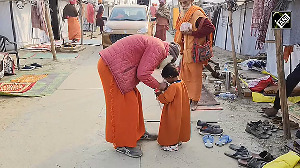On the eve of European Union Trade Commissioner Pascal Lamy's visit, the trading bloc has approached the appellate body of World Trade Organisation's Dispute Settlement mechanism against a panel's verdict on EU's preferential access mechanism for countries combating drug trafficking.
India had approached the dispute settlement body following EU's decision to provide preferential access to Pakistani exports to its 15 member states in 2001.
Commerce ministry officials told Business Standard that India would contest the case in the appellate body, though other preferential access routes -- labour and environment -- would not be taken up because the panel decision did not cover them.
Officials said the decision of giving preferential access to Pakistan, taken at the time of the US-led attack on Afghanistan, had affected India's exports to the EU.
In certain sectors like textile, Pakistan's exports had touched nearly $12 billion during 2003 from an insignificant amount in the previous years.
"A large part of these exports were to the EU and the increase could be directly linked to the general system of preferences benefits under the drug window," an Indian official said.
In its communiqué to the appeal to WTO last week, the EU has sought a review of the panel's conclusion that it has nullified or impaired the benefits accrued to India under the General Agreement on Trade and Tariffs.
It also said under the 'Special Arrangements to Combat Drug Production and Trafficking provided in Council Regulation', popularly called the drug window, it had "the burden of proving that the drug arrangements were consistent with the enabling clause" and further questioned the panel's report that noted the enabling clause was an exception to Gatt. The panel's findings were made public in September last year.
"India did not make any claims under the enabling clause and, therefore, the Appellate Body should refrain from examining the consistency of the drug arrangements with the enabling clause," the communication added.






 © 2025
© 2025